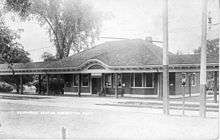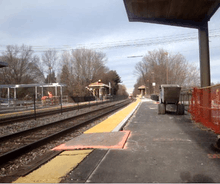Wedgemere station
Wedgemere is an MBTA Commuter Rail station in the southeast portion of Winchester, Massachusetts. Wedgemere is served by most Lowell Line trains except for several expresses, as well as a small number of Haverhill Line trains which run via the Wildcat Branch. The station consists of two platforms serving the line's two tracks on an elevated grade. The 1957-built station building, largely unused, is adjacent to the inbound platform. After several years of work, the station was made fully handicapped accessible in February 2013.[1]
Wedgemere | |||||||||||||||
|---|---|---|---|---|---|---|---|---|---|---|---|---|---|---|---|
Wedgemere station in June 2013 | |||||||||||||||
| Location | 25 Mystic Valley Parkway Winchester, Massachusetts | ||||||||||||||
| Coordinates | 42.4445°N 71.1405°W | ||||||||||||||
| Line(s) | New Hampshire Main Line | ||||||||||||||
| Platforms | 2 side platforms | ||||||||||||||
| Tracks | 2 | ||||||||||||||
| Construction | |||||||||||||||
| Parking | 103 spaces (town permit required) | ||||||||||||||
| Disabled access | Yes | ||||||||||||||
| Other information | |||||||||||||||
| Fare zone | 1 | ||||||||||||||
| History | |||||||||||||||
| Opened | Early 1850s | ||||||||||||||
| Rebuilt | 1957; February 1, 2013[1] | ||||||||||||||
| Traffic | |||||||||||||||
| Passengers (2018) | 310 (weekday average boardings)[2] | ||||||||||||||
| Services | |||||||||||||||
| |||||||||||||||
History
Boston & Lowell

The Boston and Lowell Railroad (B&L) opened to Lowell on June 24, 1835. Many of the present stations on the line opened soon after; however, the B&L did not open a station at Bacon Street in southern Winchester until the early 1850s.[3] The station, located near a bridge over the Aberjona River, was variously known as Mystic, Bacons Bridge, and Symmes Bridge (the latter after a nearby landowner).[4][5] After 1887, the B&L was leased to its former rival, the Boston and Maine Railroad, as its New Hampshire Main Line.[5]
Boston & Maine
By the end of the 19th century, the station was known by its modern name, Wedgemere, after the surrounding neighborhood, and had a small station building on the east (outbound) side of the tracks.[6] In the early 1900s, the B&M built a larger station building with an extended canopy on the west side of the tracks, which served for the next half-century.[7]
In the early 1950s, the B&M began planning a project to raise the tracks of the New Hampshire Main and the southern end of the Woburn Branch for a mile through Winchester, eliminating troublesome grade crossings downtown.[8] Construction began in 1955; boxy two-story brick stations opened at Wedgemere and Winchester Center in 1957.[3][9] The ticket office in the new station was closed in 1960 after just three years in service; thereafter, passengers bought tickets on the train. The station building hosted a coffee shop from 2008 to 2014.[9]
MBTA era and accessibility

From the introduction of Massachusetts Bay Transportation Authority (MBTA) funding in 1965 until the mid-2000s, Wedgemere station remained essentially static. The Americans with Disabilities Act of 1990 required transit agencies to make certain stations handicapped accessible. A number of high-ridership stations on the MBTA Commuter Rail system were upgraded, but due to its relatively low ridership, Wedgemere was not chosen as a key station for upgrades.[10] Wedgemere had older low-level platforms, and access from the street was via stairs only. Beginning in 2008, a local family lobbied the MBTA to make the station accessible; in July 2009, the Federal Transit Administration granted the MBTA permission to build mini-high platforms.[10] (Full-length high level platforms would not have been possible because the Lowell Line is a designated freight corridor; full-length platforms cause operational difficulties with freight trains. Wedgemere does not have room for a dedicated freight passing track like Anderson RTC.) In February 2010, the MBTA announced that $2 million in federal stimulus funds had been allotted to the project, part of a grant that also funded construction of the John W. Olver Transit Center and repairs to the Red Line tunnels between Harvard and Alewife.[11][12] The work was then intended to be finished by the end of 2010.[11]
After delays due to concerns over nearby wetlands and the appearance of the ramps from street level, the Town of Winchester granted approval in March 2011.[13] In April 2011, the MBTA began soliciting bids for the primary construction work on the station, worth $1.525 million. The scope of work included construction of the mini-high platforms and ramps from street level, as well as adding lighting, rehabilitating the low level platforms, and creating accessible parking spaces.[14] After bids came in higher than expected, a $2.503 million contract was awarded in July 2011 with notice to proceed in August.[1][15]
Construction was to be completed in mid-September 2011 ahead of the October deadline for stimulus funds, but a problem with town permitting in early September delayed the completion of the project.[16] Construction resumed in November.[17] The mini-high platforms, ramps, and new parking spaces opened on February 1, 2013, making the station fully handicapped accessible.[1] Finishing work on platform reconstruction, lighting, and landscaping lasted the spring of 2013, culminating in a reopening ceremony in June.[18]
References
- "Wedgemere Station". Transit Projects. Massachusetts Bay Transportation Authority. Archived from the original on July 1, 2013.
- Central Transportation Planning Staff (2019). "2018 Commuter Rail Counts". Massachusetts Bay Transportation Authority.
- Thomas J., Humphrey & Norton D., Clark (1985). Boston's Commuter Rail: The First 150 Years. Boston Street Railway Association. pp. 54–55. ISBN 9780685412947.
- Winchester: Main St, Common (Map). 1:3000. Atlas of Middlesex County, Massachusetts. WardMaps LLC: Geo. H. Walker & Co. 1889. Retrieved April 7, 2013.
- Karr, Ronald Dale (1995). The Rail Lines of Southern New England. Branch Line Press. pp. 229–232. ISBN 0942147022.
- Winchester (Map). WardMaps LLC: Robbins. 1898. Retrieved April 7, 2013.
- Winchester Plate 29 (Map). 1:3000. Atlas of Middlesex County, MA Vol. 2, 1906. WardMaps LLC: Geo. H. Walker & Co. 1906. Retrieved April 7, 2013.
- "Winchester Overpass Cost Boosted to $6,000,000". Boston Globe. October 21, 1953. p. 14 – via Newspapers.com.

- Roy, John H. Jr. (2007). A Field Guide to Southern New England Railroad Depots and Freight Houses. Branch Line Press. p. 260. ISBN 9780942147087.
- Talbot, Gary (February 12, 2010). "Rail Accessibility A Win in Winchester". MassDOT Blog. Massachusetts Department of Transportation. Retrieved March 5, 2017.
- Laidler, John (February 21, 2010). "MBTA to enhance access for disabled". Boston Globe. Retrieved March 5, 2017.
- "All Fed Stimulus Highway Funds Obligated". MassDOT Blog (Press release). Massachusetts Department of Transportation. February 10, 2010. Retrieved March 5, 2017.
- Knight, Ellen (March 14, 2011). "One step closer to ADA improvements at Wedgemere". Daily Times Chronicle. Retrieved 11 February 2013.
- Mullan, Jeffery B. & Davey, Richard A. (April 11, 2011). "Notice to Bidders" (PDF). Massachusetts Bay Transportation Authority. Retrieved February 11, 2013.
- "Awarded Contract: D36CN01: Wedgemere Station Accessibility Improvements, ARRA FUNDED". Massachusetts Bay Transportation Authority. Retrieved February 11, 2013.
- Knight, Ellen (September 5, 2012). "Work on ramps at Wedgemere comes to halt". Daily Times Chronicle. Retrieved February 11, 2013.
- MacDonald, Evan (November 13, 2012). "Wedgemere station project may finish by January". Wicked Local Winchester. Retrieved March 5, 2017.
- "Wedgemere station is now fully accessible". Massachusetts Bay Transportation Authority. June 6, 2013. Retrieved June 6, 2013.
External links
| Wikimedia Commons has media related to Wedgemere station. |